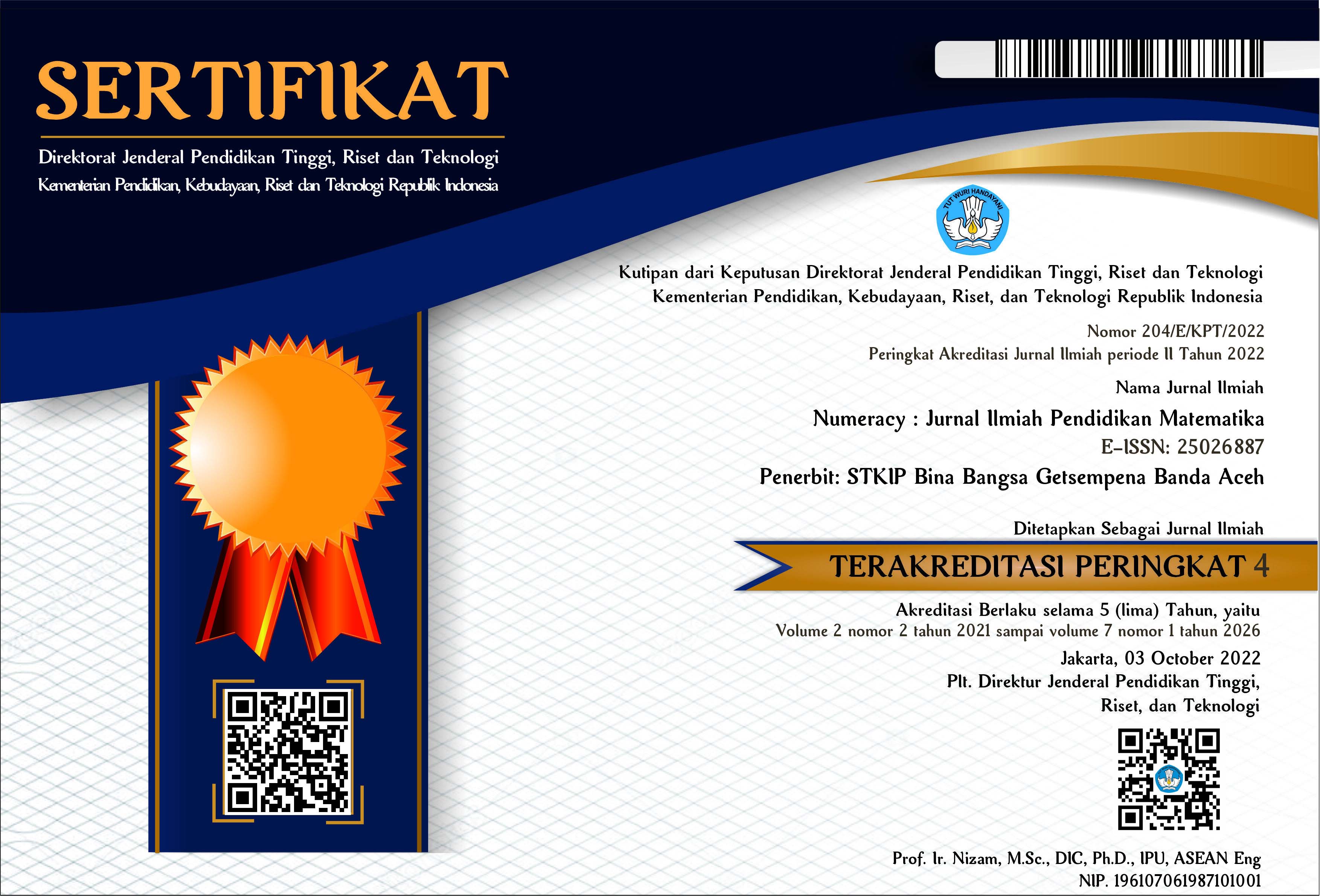ANALISIS MATERI SULIT DIPAHAMI DAN MISKONSEPSI MAHASISWA DALAM MATA KULIAH KALKULUS INTEGRAL
Abstract
This study aims to analyze and describe what materials are difficult in calculus courses and also materials that are misconceptions. This research was conducted to improve the competence of students in the future. The formulation of the problem in this study is "How to improve student competence in integral calculus courses?" The sub-problems are: 1) What materials do students have misconceptions in integral calculus courses? 2) What materials are difficult for students to understand in integral calculus courses? The research method used is descriptive qualitative by surveying students of Mathematics Education, Faculty of Teacher Training and Education, Tanjungpura University. From the overall results, there were 22 students (60%) did not experience misconceptions and 14 students (40%) experienced misconceptions in the first concept. In the second concept, 40% did not experience misconceptions and 60% of students experienced misconceptions. For the third concept, 70% of students experienced misconceptions and 30% of students did not experience misconceptions. In the fourth concept, 28% of students experienced misconceptions and 72% of students did not experience misconceptions. For the fifth concept, 6% of students experienced misconceptions and 94% of students did not experience misconceptions. And for the sixth concept there are 28% of students experiencing misconceptions and 72% of students not experiencing misconceptions.
References
Ashlock, R. B. (2006). Error Patterns in Computation (Using Error Patterns to Improve Instructions). New Jersey. Merrill Prentice Hall.
Atiqoh, K. S. N., & Hafiz, M. (2021). Miskonsepsi Mahasiswa Matematika pada Induksi Menggunakan Certainly of Response Index (CRI). Jurnal Padegogik, 4(2), 43–51. https://jurnal.unai.edu/index.php/jpd/article/view/2536
Dahar, R. W. (2011). Teori-Teori Belajar & Mengajar. Jakarta: Erlangga.
Faradillah, A., Hadi, W., & Soro, S. (2020). Evaluasi Proses dan Hasil Belajar (EPHB) Matematika dengan Diskusi dan Simulasi (DiSi). Jakarta: Uhamka Press.
Harlen, W. (1992). The Teaching of Science. London: David Fulton.
Haydar, H. (2002). Daring To Ask the Hard Questions : the Effect of Clinical Interview Training Upon Teachers Classroom Questioning. Seven, 33–38.
Hughes, A. (2003). Testing for Language Teacher. New York: Cambridge University Press.
Kilpatrick, J., Swafford, J., & Findell, B. (2001). Adding it Up: Helping Children Learn Mathematics. Washington, DC: National Academy Press.
Murniasih, T. R., Ferdiani, R. D., Agustina, R., & Kanjuruhan, U. (2018). Identifikasi Miskonsepsi Siswa Smp Pada Materi Lingkaran Dengan Menggunakan Three Tier-Test. Jurnal Ilmiah Edukasi & Sosial, 9(September), 174–180.
Nasional, D. P. (2007). Tes Diagnostik. Jakarta: Departemen Pendidikan Nasional.
Pratomo, G. N., Suhartini, & Ikhsanudin. (2021). Student’s Misconception Profile of First Semester 10 th Grade on Biology . Proceedings of the 6th International Seminar on Science Education (ISSE 2020), 541(April). https://doi.org/10.2991/assehr.k.210326.020
Shodikin, A. (2017). Pengembangan Bahan Ajar Kalkulus Integral Berbasis Animasi. AKSIOMA: Jurnal Program Studi Pendidikan Matematika, 6(1), 1. https://doi.org/10.24127/ajpm.v6i1.887
Sudjana, N. (1991). Penilaian Hasil Proses Belajar Mengajar. Bandung: PT. Remaja Rosdakarya.
Sutrisno, L., Kresnadi, H., & K. (2008). Pengembangan Pembelajaran IPA SD. Jakarta: LPJJ S1 PGSD.
Sutrisno, L., Kresnadi, H., & Kartono. (2008). Pengembangan Pembelajaran IPA SD. Jakarta: LPJJ S1 PGSD.
Suwarto. (2017a). Pengembangan Tes Diagnostik dalam Pembelajaran. Yogyakarta: Pustaka Pelajar.
Suwarto. (2017b). Pengembangan Tes Diagnostik dalam Pembelajaran. Yogyakarta: Pustaka Pelajar.
Suwarto. (2017c). Pengembangan Tes Diagnostik dalam Pembelajaran. Yogyakarta: Pustaka Pelajar.
Utami, R. (2019). Analisis Miskonsepsi Siswa Dan Cara Mengatasinya Pada Materi Bentuk Aljabar Kelas Vii-C Smp Negeri 13 Malang. JPM : Jurnal Pendidikan Matematika, 3(1), 37. https://doi.org/10.33474/jpm.v3i1.2606
Zetriuslita, Z., Ariawan, R., & Nufus, H. (2016). Analisis Kemampuan Berpikir Kritis Matematis Mahasiswa Dalam Menyelesaikan Soal Uraian Kalkulus Integral Berdasarkan Level Kemampuan Mahasiswa. Infinity Journal, 5(1), 56. https://doi.org/10.22460/infinity.v5i1.p56-66



















